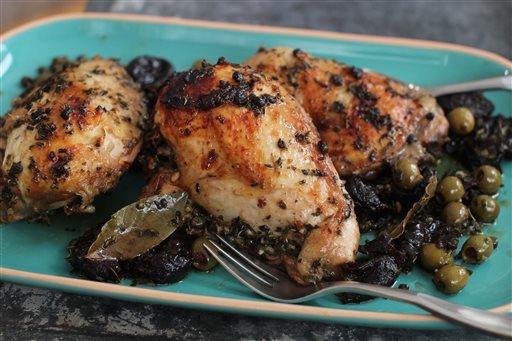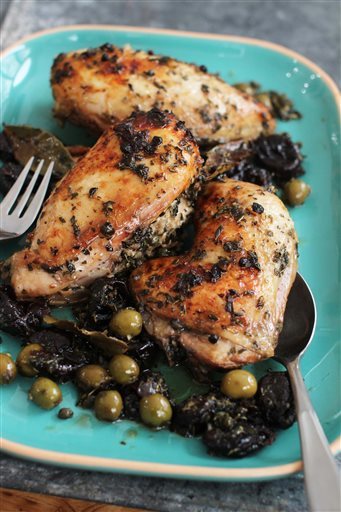When this recipe was first created by The Silver Palate catering and take out shop on the Upper East Side of Manhattan, it earned an immediate following. When the recipe was later published in “The Silver Palate Cookbook” by Sheila
When this recipe was first created by The Silver Palate catering and take out shop on the Upper East Side of Manhattan, it earned an immediate following. When the recipe was later published in “The Silver Palate Cookbook” by Sheila Lukins and Julee Rosso, it was a revelation, mostly thanks to its eccentric ingredient list: Vinegar? Olives? Prunes? Capers? Garlic? Brown sugar? White wine? All in one dish?
Yes! To taste it was to be converted.
And so for a nice chunk of time during the ’80s this dish made appearances on tables all over the country, sometimes for family dinners, but more often for entertaining. I grew up on this dish (my mother was an early adopter of it). It was one of the first “grown up” meals I served to family and friends as a budding cook, and not too long ago I even made it to bring to a kindergarten potluck for one of my kids.
Of course, I also had a deeper connection to this recipe. My father, Peter Workman, was the publisher of the “Silver Palate Cookbook,” so I really felt like the recipe was part of my family’s culinary history.
And for a long time it was the first dish on my Passover menu every year. Thankfully, this is not a dish to forget, or imagine to be dated in any way. The faultless and brilliant combination of flavors is timeless, the recipe is pretty foolproof, the chicken is unfailingly moist, and it can be made ahead. Make it again, if you have forgotten it for a while. Or make it for the first time, and tell me that you’re not a card-carrying lifetime chicken marbella fan.
CHICKEN MARBELLA
Start to finish: 1 1/2 hours, plus marinating (30 minutes active)
Servings: 10
1/2 cup olive oil
1/2 cup red wine vinegar
1 cup (about 8 ounces) pitted prunes
1/2 cup (about 3 ounces) pitted Spanish green olives
1/2 cup capers, with a bit of juice
6 bay leaves
1 head of garlic, minced
1/4 cup dried oregano
Kosher salt and ground black pepper
10 pounds quartered chickens pieces
1 cup packed brown sugar
1 cup dry white wine
1/4 cup flat-leaf parsley or fresh cilantro, finely chopped
In a large bowl, combine the olive oil, vinegar, prunes, olives, capers and a splash of the juice, the bay leaves, garlic, oregano and a hefty pinch each of salt and pepper. Add the chicken and stir to coat. Cover the bowl and refrigerate overnight.
When ready to cook, heat the oven to 350 F.
Arrange the chicken in a single layer in 1 or 2 large, shallow baking pans. Spoon the marinade evenly over the chicken. Sprinkle the chicken pieces with the brown sugar and pour the white wine around them. Bake, basting frequently with the pan juices, until the thigh pieces reach 170 F and the breasts reach 160 F, 50 minutes to 1 hour.
With a slotted spoon, transfer the chicken, prunes, olives and capers to a serving platter. Moisten with a few spoons of the pan juices and sprinkle generously with the parsley or cilantro. Serve the remaining pan juices on the side.
Note: To serve chicken marbella cold, cool to room temperature in the cooking juices before transferring the pieces to a serving platter. If the chicken has been covered and refrigerated, reheat it in the juices, then allow it to come to room temperature before serving. Spoon some of the reserved juices over the chicken.
Nutrition information per serving: 780 calories; 370 calories from fat (47 percent of total calories); 42 g fat (10 g saturated; 0 g trans fats); 190 mg cholesterol; 630 mg sodium; 37 g carbohydrate; 2 g fiber; 28 g sugar; 60 g protein.
(Recipe adapted from Julee Rosso and Sheila Lukins’ “The Silver Palate Cookbook,” Workman, 1979)




